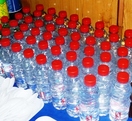 Plastic Bottled Water
Plastic Bottled Water In our Blog entitled, "Research Suggests BPA Law Benefits Are Eliminated By Use of BPS" dated January 28, 2013, we detailed the shortcomings of the BPA (Bisphenol A) prohibition law. Although the law provided for the elimination of BPA in certain products such as baby bottles and cups, it was quickly substituted with BPS (Bisphenol S). In that BPS is also a hormone disruptor equally dangerous to BPA, the benefits to the law were effectively neutralized.
New research from a study out of Germany, indicates that BPA and BPS are not the only things to be concerned about with regard to plastic water bottles and other plastic packaged consumable products. The study was conducted by Goethe University Frankfurt in conjunction with a team of researchers from the German Federal Institue of Hydrology and tested 18 different plastic bottled waters. Test results indicated that plastic bottled water contains over an astounding 24,000 different types of chemicals leeched from the plastic. Among these potentially dangerous chemicals was the completely unregulated DEHF (di 2-ethylhexyl fumarate). DEHF is used to create flexibility in plastic and like BPA and BPS, is a hormone disruptor.
Hormone disrupting chemicals are associated with, among other things, infertility, birth defects, develomental disorders, learning disabilities, attention deficit disorder (ADD), cognitive disorders, breast cancer, thyroid cancer, prostate cancer and other cancers. Ostensibly, our food and beverage consumer protection laws do not fully protects us, leaving it up to the consumer to educate and protect themself. In order to evade the above desribed potentially harmful side effects of plastic, consumers should avoid purchasing any type of food or beverage that is contained in plastic. Perhaps it is time to go back to the day when we used glass to contain our food and beverages.
Long Island Lawyer
Paul A. Lauto, Esq.


 RSS Feed
RSS Feed

